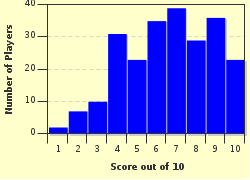Quiz Answer Key and Fun Facts
1. We'll start this quiz with the same word that many encyclopedias start with: Aardvark. It is derived from the Dutch "aardvarken". The word "aard" means "earth", and a "varken" is a kind of animal. What animal?
2. The word 'yacht', meaning a type of ship, has been derived from the Dutch word 'jacht'. Apart from a ship type, what other meaning of the word 'jacht' is common in current-day Dutch?
3. The workers who moved to America did not like the English word 'master', and in the 19th century in the US this got replaced by 'boss', a word of Dutch origin. What is the exact Dutch word from which 'boss' is derived?
4. When a Dutchman is asked which Dutch word is used in most languages, chances are that he names a word that originally meant 'separateness', but in the 20th century got a much more negative meaning. Which word do I mean?
5. The word 'atlas' is also a word of Dutch origin, although its roots are older. It was first used in its modern meaning of 'a book of maps' by a Dutch cartographer. What is the name that he was known by?
6. Skating is a national sports of the Netherlands, and it might therefore not surprise you that the English word 'skate' is of Dutch origin. Which Dutch word formed the basis for the English word skate?
7. We stay with ice, more precisely, with the 'iceberg'. It has been derived from Dutch 'ijsberg'. 'Ijs' does indeed meet 'ice', but what's a 'berg'?
8. The Dutch inhabitants of South Africa used to be called the "Boers" after the Dutch word "boer". What does "boer" actually mean in Dutch?
9. When certain people, like military, are granted a holiday, it is called a "furlough". This comes from the Dutch "verlof", meaning what?
10. The city and state of New York were erected as the Dutch colony of New Netherlands, with its capital New Amsterdam. No wonder that several old features of the city have their name derived from Dutch. Three of the names below are named after Dutch cities. Which one is not?
Source: Author
engels
This quiz was reviewed by FunTrivia editor
stedman before going online.
Any errors found in FunTrivia content are routinely corrected through our feedback system.
